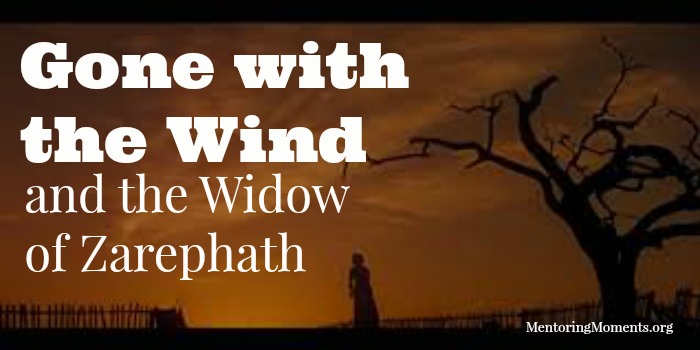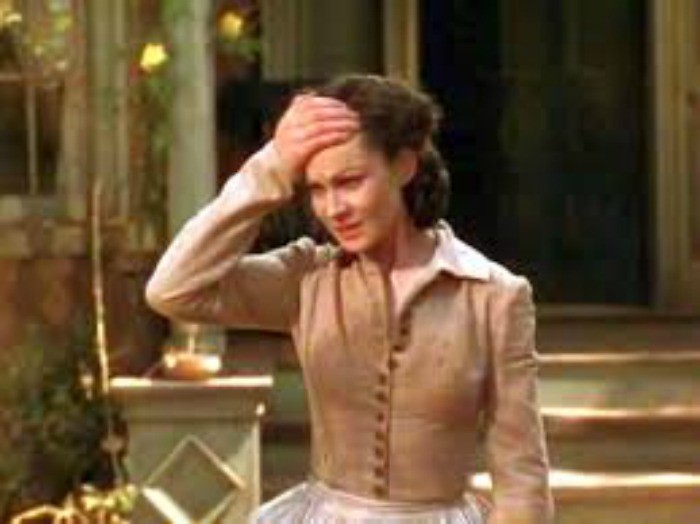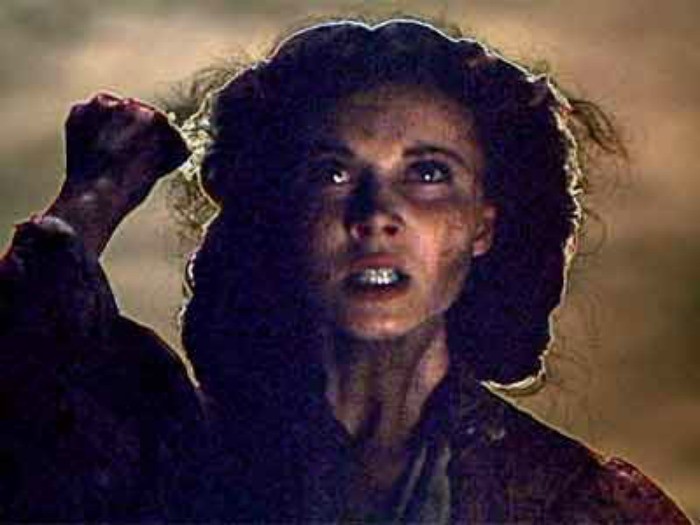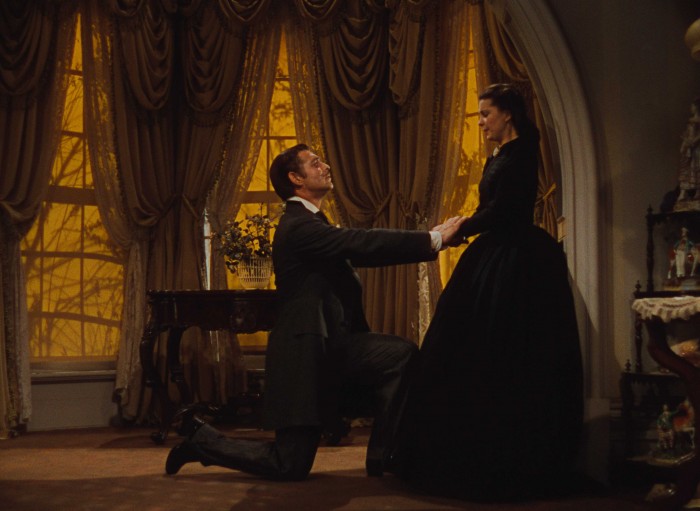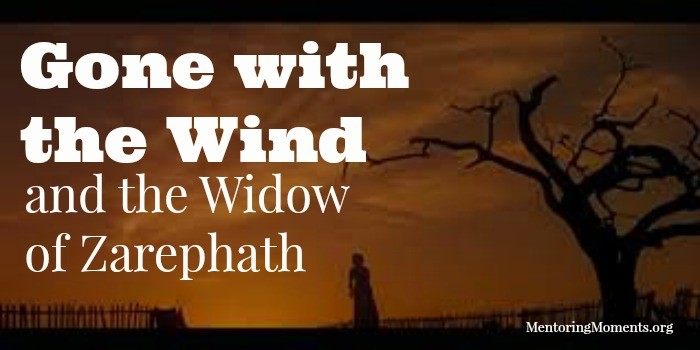When you read the title, you may have gone: say what? At first blush there seems to be little resemblance between the movie Gone with the Wind and its main character Scarlett O’Hara and the biblical account of the widow of Zarephath. But, as I tried to think of stories where hunger was a significant issue for the main woman character, this movie came to mind. Gone with the Wind was the first book I ever stayed up all night to finish as a teenager and still is one of the best movies I’ve ever seen. Moviegoers thought so too as this full-color movie made in 1939 won eight Oscars and was one of the largest grossing movies of all time. It returned to the big screen many times over the decades. The title of the book/movie actually comes from the Bible. Psalm 103:16 NLT says, “The wind blows, and we are gone—as though we had never been here.”
The south had been ravaged by the Civil War. General Sherman marched through Georgia, his soldiers, looting, raping, and burning. The O’Hara farm had not escaped devastation, but the house still stood because Yankee troops had used it as a headquarters. Scarlett’s parents were dead and her sisters worse than useless.
Remember the scene as Vivien Leigh, playing Scarlett O’Hara, stood on a hill on the Tara plantation with the sunset behind her, her hands dirty from digging in red Georgia clay, trying to find edible roots for her family and servants. The camera is below her, shooting up. She raised her fist, vowing to do whatever it took, and shouted into the wind, “As God is my witness, I’ll never be hungry again.” Fade to black. Intermission. (It’s four hours—you need the break).
Hunger.
Of all the needs we have as humans, it’s one of the foremost. Scarlett O’Hara faced that challenge with a proud determination not to be beaten, to find a way to have all the things she needed—and wanted. After Scarlett became a war widow, she used her beauty to charm and marry her sister’s well-to-do merchant fiancé. She then ran his lumber business in a mercenary way and became wealthy. After her need to provide for her family was sated, her hunger for love became the driving force in her life. That’s where Rhett Butler, played by Clark Gable, came in. If only Scarlett could have been as successful in love as she was in business.
The widow of Zarephath in 1 Kings 17 knew hunger too. She was down to the last meal for herself and her son. This Gentile woman, in an ancient society with no social programs for the destitute, saw no way out. There were no jobs for women in a society that had slaves. She and her little boy would starve; she knew it. Their last meal would take all the flour and oil she had left. There were no sister’s boyfriends standing in the wings to help her. But help was on the way.
While the flour and oil were running out in the widow’s home, God had been preparing a rescue. He is the original Multi-tasker. He was readying his prophet Elijah to go to the widow, while He was preparing the widow for his arrival. Elijah knew that God could provide; He had provided for Elijah’s food during the drought and famine. God had miraculously sent ravens to bring Elijah meat and bread each morning and night. (Ravens are birds that sometimes neglect to feed their own young.) Elijah got his drinking water from the brook Kerith. But then the brook dried up, as brooks sometimes do. Rather than creating a new source of water for him there and continuing the bird catering service, God told him to go to the town of Zarephath in Phoenicia about 100 miles away.
God told Elijah that He had directed a widow to feed him there. Think about that. This woman who has had all she could take is going to have one more thing put on her: a semi-permanent houseguest. We aren’t told how God instructed the widow to feed Elijah, but he obeys and meets the widow at the town gate. Not by coincidence but by God-incidence. He asks her for some water and she gets it for him. Then he asks what men have been asking women ever since: “And while you’re at it, would you bring me something to eat?”
She answers (perhaps more kindly than I might have) by explaining that she has very little—a last meal for her and her son before they starve. Elijah asks her to make a small loaf of bread for him first and then make something for her and her son. He gives her a promise that, when believed and acted upon, will make all the difference: the flour won’t run out and the jar of oil won’t become empty until the Lord ends the drought. Should she believe him? He’s a stranger. But remember, God said He had instructed a widow to feed him. She knows about God to some extent because she says in verse 12, “As surely as the Lord your God lives.” Notice it is “your God” not “our God.”
She did what Elijah and God told her to do. And even what the culture of her day told her to do: help strangers—be hospitable—share what you have. She obeyed even though she couldn’t understand how it could be true. She made Elijah’s food first. And then she came back to make food for her and her son. And there was plenty! It was the finest flour, the best extra virgin olive oil; it made the sweetest bread. And it was there every day—morning, noon, and night for the three of them. Her needs were supplied because God kept His word to her, just as He always keeps His word. (See Matthew 6:25-31.)
Not only were the widow’s needs supplied, she later witnessed another miracle. First Kings 17:17-24 tells us her little boy becomes ill and dies. She takes her distress and grief to Elijah, believing that God took her child because of her sin (some guilt she was harboring).
Elijah carried the boy to the room where he had been staying and performed the first resuscitation from the dead of the Old Testament. Because no one had ever been raised from the dead before, when Elijah cried out to the Lord for the life of the boy there was no precedent, no handbook on how to do it. Elijah simply trusted that the Lord who gives life could give it back if He chose. When nothing happened with his first prayer, Elijah stretched himself over the boy three times, crying out to the Lord. God brought the child back to life and Elijah carried him to his mother.
This part of the story also reminds me of Gone with the Wind when Scarlett and Rhett Butler’s little girl, Bonnie Blue, fell off her pony and died. Scarlett accepted it with stoic resignation. Mammy explained, “that girl got the strength to face what she got to face.” But Rhett stayed with the child’s body, not allowing her to be buried, praying that she’d be brought back. However, Bonnie Blue wasn’t miraculously brought back. Hollywood would have considered that impossible, and they only deal in the improbable.
The best part of the widow’s story is the end. She had gone from a stoic resignation to whatever life handed her, similar to Scarlett, to a living hope in the One who loved her before she knew Him. She and her son had been fed miraculously for months or years and her son had been raised from the dead. Then she confessed (v. 24) that Elijah was a man of God and, much more important, that the Word of the Lord is the truth.
What about us? If everything we relied on was suddenly gone with the wind, what would remain? Would we be willing to obey what God tells us to do, or wait on Him when there’s nothing we can do? Are we like Scarlett O’Hara plotting and planning how to get what we want? Or are we more like the widow of Zarephath, growing in our understanding of God and watching as He works miracles of provision and grace in our lives?
©2016 Vicki Huffman
*Affiliate links included.
About Vicki Huffman
National award-winning journalist Vicki Huffman's latest book is Soon to Come: The Revelation of Jesus Christ. It is a verse by verse exposition of the only purely prophetical book in the New Testament. Her other five books are: The Jesus Moses Knew: How to See Christ in the Old Testament; A Secret Hope (novel); Still Looking: Finding the Peace of God in Job Loss; Plus Living: Looking for Joy in All the Right Places, and The Best of Times. All are available in print and e-book on amazon.com. Vicki is a national award-winning author who has taught the Bible for many years. She was an editor for several Christian publishing houses, including Thomas Nelson and David C. Cook Ministries.
- Web |
- More Posts(120)

